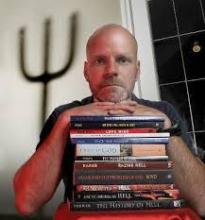punishment
Ta-Nehisi Coates on the Obama administration’s decision to seek the death penalty for the Charleston shooter: “The hammer of criminal justice is the preferred tool of a society that has run out of ideas.”
2. At Baylor, the Real Story Isn’t Hypocrisy. It’s the Victims of Sexual Assault.
“... this is a story much larger than Ken Starr and Baylor. This story is about power, and money, and institutions that claim to be faith-based but refuse to stand for victims and against violence.”
Lives in the hands of algorithms—

Aside from Universalists, most Christian traditions contain the doctrine of judgment, although the particulars of how that judgment is carried out varies along a spectrum. Whether it is actual physical torture for all eternity or some sort of separation from God, whether there’s purgatory or a second chance post mortem, there exists a form of judgment within the systems of Christian faith.
Good parenting sensibilities tell us we shouldn’t shy away from difficult truths, and although we try to be age-appropriate, we are obligated to share even the most unpalatable aspect of the Christian faith with our kids. The problem is: children don’t yet have the emotional maturity and logical capability to process a belief in eternal punishment. Their budding minds can’t reason through the theological necessity of judgment in a loving God. So they panic and retreat into fear. In order to coax them out of their distress we comfort them, it’s okay, Jesus will save you, just believe in Jesus.
And so it begins — even as kids develop and eventually learn the nuances of Christian life, they are bearing the invisible baggage of fear that had them gripping for Jesus.

This year we are presenting the Raven Award on Nov. 12 to Kevin Miller for his documentary with a question for a title: Hellbound?. Autocorrect doesn’t like the question mark, especially when it’s followed by a period, but I’m glad Kevin used it. Because the idea of hell raises all kinds of questions, particularly about the relationship of God to sin. (For Adam, it raises questions about God’s justice – read his reflections here.) For me, the idea of hell raises questions about punishment, like these:
Does God punish sin in this life and if so, how?
Does God punish unrepentant sinners in the next life with eternal suffering?
These questions have corollaries, of course:
Does God reward the righteous in this life and if so, how?
Does God reward a life of righteousness with eternal bliss?

The bearer of Good News, the one who carries the message of Resurrection, is not motivated by fear of punishment (either for herself or others) but by confidence in her experience of the love of God. She knows God's love is greater than anything in herself or in her hearers; that Jesus can conquer anything in them that is not controlled by holy love.
"Such love has no fear, because perfect love expels all fear. If we are afraid, it is for fear of punishment, and this shows that we have not fully experienced his perfect love." 1 John 4:18
God's love has the final word, for Jesus has conquered the sin of the whole world and has defeated the grave. Christ's best messengers know this love by its all-consuming redemptive activity in themselves and confidently carry this love to others, without fear.

"THIS IS THE LORD'S DOING; it is marvelous in our eyes. On this day the Lord has acted; we will rejoice in and be glad in it." We will be singing these words from Psalm 118 on Easter Sunday, and they pinpoint a critical issue in our religious witness. Do we have the courage to have God be the subject of sentences, or is God usually the object of our reflections? There is a difference. Do we make ourselves really the subject of our sentences, so that religion is about our doings and ideas and needs? The scriptures insistently talk about what God did and is doing and will do in Christ, the crucified and risen one. Our role is to rejoice in the way God acts upon us, with us, around us, behind us, above us, ahead of us, through us.
Praise is the litmus test. If God is experienced as the one who is acting, the impulse to praise is inevitable. This may help us understand the importance of the psalms in our lectionary. They aren't mere supplementary devotions. As supreme words of praise, they test the authenticity of our reactions to the good news. They test and they can train. The psalter is the church's manual to help practice the "scales of rejoicing," to borrow a phrase from W.H. Auden's "Christmas Oratorio." A phrase on Auden's tombstone comes back to me: "In the prison of his days / Teach the free man how to praise." The psalms come to life only where this teaching is taken seriously.

On the first Monday of September, America honors working stiffs by taking a paid day off. But does Labor Day celebrate an enterprise that God intended to be a punishment?
In a recent New York Times essay on the frenetic hustle of modern life, humorist and author Tim Kreider took the Puritans and their infamous work ethic to task. They had turned toil into a virtue, he argued, whereas God had invented it to chastise the disobedient Adam and Eve.
In an interview, Kreider explained that he was referring to Genesis, in which God tells Adam “by the sweat of thy brow shalt thou eat thy bread.” In the same chapter, the serpent is sentenced to an eternity of belly slithering and Eve condemned to severe childbearing pains.
“Coming as it does on the heels of the infamous Illicit Fruit Incident, the details of which there’s no need to re-hash, certainly makes it sound punitive,” said Kreider, who said he’s a veteran of 18 years of Sunday school, but no Bible scholar.
Last month, the U.S. Senate held its first hearing ever on the issue of solitary confinement in prisons. To draw attention to the issue, the National Religious Campaign Against Torture urged Americans to fast for 23 hours for one day, symbolizing the 23 hours a day prisoners spend in solitary confinement each day.
"Christian scriptures and the scriptures of all religions say much about the way we are to treat other human beings, especially the most vulnerable," said the Rev. Richard Killmer, executive director of NRCAT. "And all religious traditions teach that it is important to honor and respect the dignity and worth that God has endowed in each human being. When we put people into solitary confinement cells, which we know are going to cause harm, then we have deeply violated that requirement from God to honor and respect each human being."

Naseem Rakha, author of the 2009 novel The Crying Tree sees justice differently. Rakha, an award-winning journalist whose work has been featured on National Public Radio and elsewhere, has covered two death penalty cases in Oregon -- the only two in that state's history -- and has spent considerable time exploring the deeper story behind capital punishment, retributive justice and forgiveness.
"What I learned from talking to these victims is that there is a place, not called closure, not called moving on, but there is a place of empowerment," Rakha said in a recent interview with God's Politics. "Crime strips people of power, and there's nothing that the justice system or really even churches can give to you to replace that power. It is an act of wanting to sit down and meet with the person who strips that power from you that has transformed people's lives and gotten them to a point where they can forgive the act, because they see the perpetrator no longer as a monster, but as a human that has made a terrible mistake."